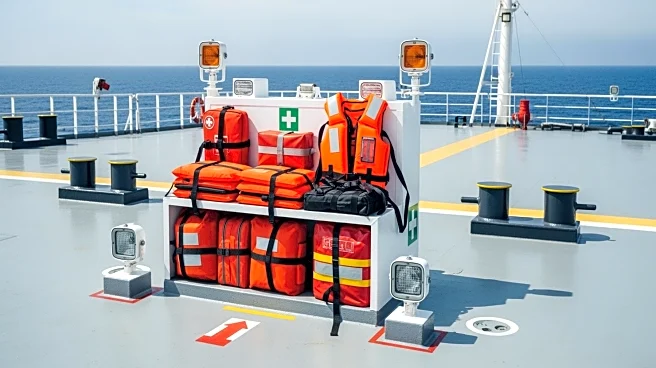What's Happening?
NYK and NYK Ship Management Pte. Ltd. (NYKSM) conducted a crisis-response drill on October 17, simulating an emergency scenario off the coast of Okinawa Island. The exercise involved a fire breaking out in the cargo hold of a car carrier, followed by
a collision with a small craft. This drill was part of the 'Remember Naka-no-Se' safety promotion campaign and involved collaboration with external stakeholders, including Japan's Ministry of Land, Infrastructure, Transport and Tourism, the 11th Regional Coast Guard Headquarters, and the Japanese Shipowners' Association. The drill aimed to simulate the intensity of an actual emergency, focusing on fire response, rescue operations, and effective coordination across NYKSM's offices in Singapore and India.
Why It's Important?
The drill underscores the importance of preparedness in maritime operations, highlighting the need for effective crisis management strategies. By simulating real-world emergencies, NYK aims to enhance safety protocols and ensure swift coordination among international offices. This initiative is crucial for maintaining safety standards in the shipping industry, potentially reducing the risk of accidents and improving response times during actual emergencies. Stakeholders in the maritime sector, including shipping companies and regulatory bodies, stand to benefit from improved safety measures and crisis management practices.
What's Next?
Future drills and safety campaigns are likely to be conducted to further refine emergency response strategies. Stakeholders may review the outcomes of this drill to implement improvements in safety protocols and training programs. The collaboration between NYK and external agencies suggests ongoing efforts to enhance maritime safety, potentially influencing industry-wide standards and practices.
Beyond the Headlines
The drill highlights the ethical responsibility of shipping companies to prioritize safety and environmental protection. By simulating emergency scenarios, NYK demonstrates a commitment to safeguarding human lives and minimizing environmental impact during maritime operations. This approach may encourage other companies to adopt similar practices, fostering a culture of safety and responsibility within the industry.
















